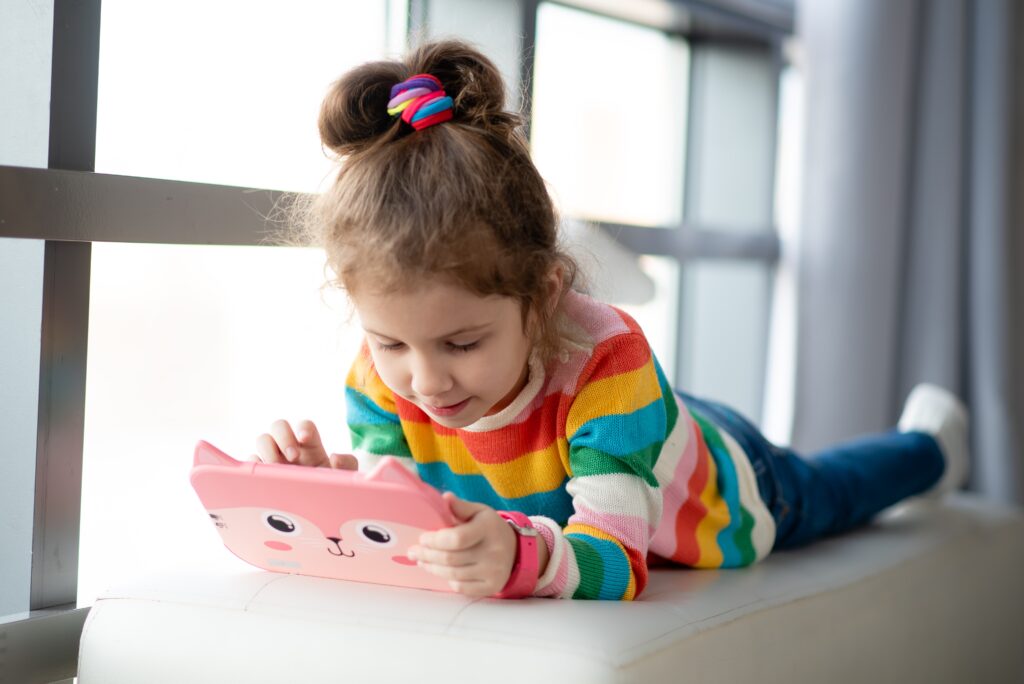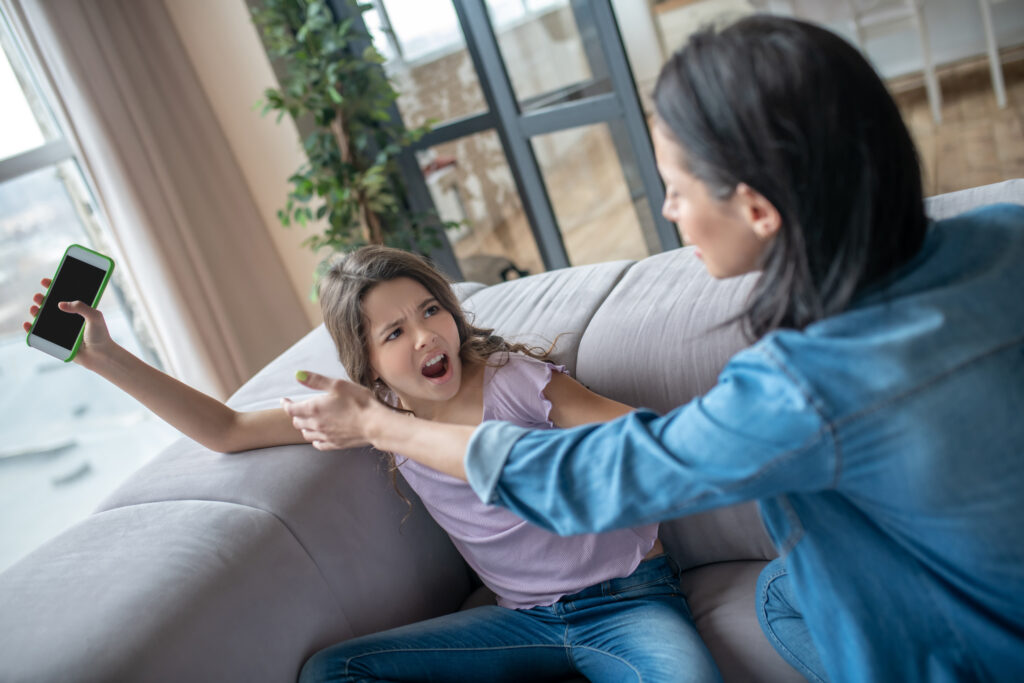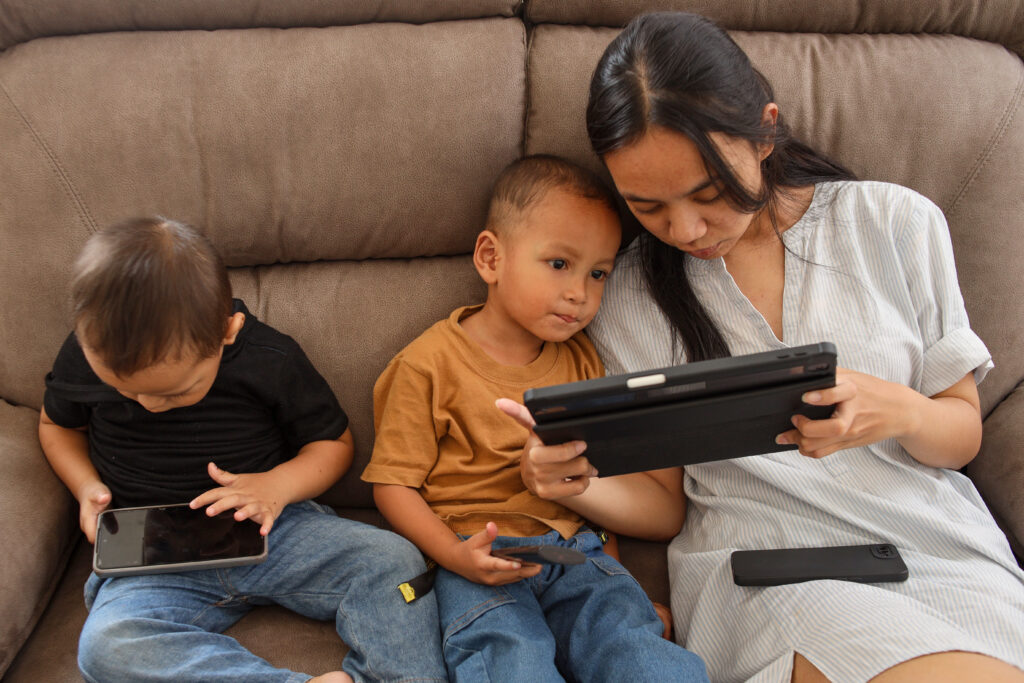
- +61 1300 704 750
- admin@parentinggenie.com.au
- PO Box 706, Townsville, QLD 4810

It’s dinner time, but your toddler refuses to put down the tablet. You call their name, but they barely look up, eyes fixed on the bright cartoon playing in front of them. You feel torn – the screen kept them quiet while you prepared dinner, but now it’s turning into a battle. Sound familiar? You’re not alone. Child’s Screen Time!
Screen time has become one of the biggest parenting challenges of our generation. Between TVs, tablets, smartphones, and even smart toys, children are surrounded by screens more than ever before. While screens can be educational and even a lifesaver for busy parents, too much screen time can affect a child’s behaviour, sleep, and wellbeing.
So how do you strike a healthy balance? Let’s dive into why screen management matters and how you can guide your child toward a balanced, screen-free lifestyle — without constant battles.
Screens aren’t inherently bad. Educational apps, interactive shows, and video calls with loved ones all offer benefits. The problem arises with excessive screen time.
Research shows that too much time on screens can:
One mum shared how her preschooler’s sleep problems started when screen use crept into bedtime. “He would cry a lot at night, tossing and turning,” she explained. “Once we limited tablets after dinner and focused on a calmer bedtime routine, his sleep habits improved dramatically.”
Guidelines vary, but here’s a quick snapshot based on child development experts:
Remember, it’s not just the amount of sleep your child gets but also the quality of time spent away from screens that matters.
Every child is different, but here are some red flags to watch for:
If these sound familiar, don’t panic — gentle changes to your child’s routine can make a big difference.

Here’s how you can help your child develop healthy screen time habits:
Set clear rules about when and where screens can be used. For example:
This routine helps your child know what to expect and reduces battles.
Children often copy their parents. If they see you scrolling endlessly, they’ll want to do the same. Show them healthy screen habits by putting your phone aside during family time.
Balance screen use with active play. Encourage outdoor games, dancing, or even a walk after dinner. The more your child moves, the easier it is for them to fall asleep and sleep better.
Boredom often drives screen use. Stock your home with puzzles, art supplies, and books. Young children especially benefit from imaginative play that supports brain development.
One dad shared how swapping tablet time for drawing together helped reduce tantrums: “At first, my son resisted. But after a week, he started asking to ‘make art’ instead of watching TV. It changed our evenings completely.”
Blue light from screens interferes with the body’s natural sleep pattern. Avoid screens at least an hour before bed and replace them with calming routines like reading, lullabies, or cuddles.
This is also where tools like our Baby Sleep Online Course come in handy — giving you practical strategies to improve your child’s sleep without relying on screens.
If your child does watch, choose high-quality programs or apps designed for learning. Watch together so you can guide them and turn screen time into a shared experience.
As children grow, let them help decide limits. Encourage them to notice how they feel after screen use: Do they feel tired? Energised? Cranky? This builds lifelong skills in self-management.

Here’s how to handle real-life parenting struggles:
“I thought screen time was harmless until my daughter’s teacher mentioned she was falling asleep in class. Once we cut back evening TV, her energy levels improved, and she stopped dozing off.” – Anna, mum of a preschooler.
“Screens were causing fights every weekend. Now we plan family activities outdoors — the kids don’t even ask for tablets as much.” – Tom, dad of two.
Sometimes managing screen time feels overwhelming. If you’re worried about your child’s behaviour, sleep problems, or constant battles around screens, don’t hesitate to ask for help.
👉 Genie Chat connects you instantly with parenting experts who can guide you.
👉 Join the Parenting Genie Community for tips, encouragement, and connection with other families.
👉 Explore our Baby Sleep Online Course to learn how to build a calm bedtime routine and improve sleep habits.
Excessive screen time can quickly add up, especially when children spend hours each day on tablets, games, or watching TV. While screens are part of modern life, it’s important to balance them with other activities, social play, and rest to protect children’s well-being. Setting limits and creating screen-free moments, such as during family meals or bedtime, helps children build healthier habits and supports better behaviour overall.
Screens are part of modern life, but they don’t have to control your child’s day. With gentle boundaries, creative alternatives, and a focus on balance, you can help your child grow up with healthy screen habits.
Remember, it’s not about banning screens, but teaching children how to use them wisely. By creating structure and offering support, you’ll protect their well-being while keeping family life calmer and happier.
👉 Start today with Genie Chat for instant expert advice.
👉 Join the Parenting Genie Community for ongoing support.
👉 Check out our Baby Sleep Online Course for bedtime solutions that work.
The Parenting Genie website has comprehensive resources and tools.
The Raising Children website has some tips and insights on screen time.